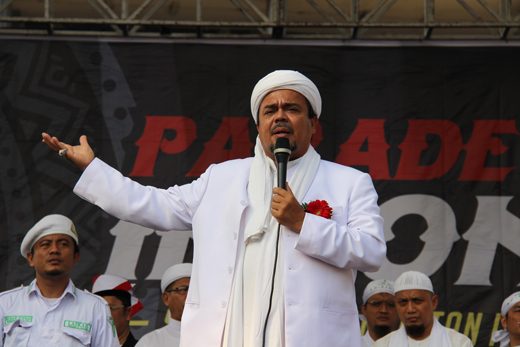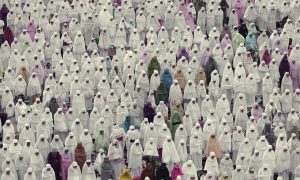The Indonesian government has officially banned the hardline Islamic Defenders Front (Front Pembela Islam, FPI) through a joint ministerial decree (SKB) on 30 December 2020. It lists six reasons for the ban. Among them is that FPI has no legal grounds to operate as a civil organization, and many of its members were involved in terrorism, illegal raids, and other violent activities.
On December 12, 2020, the police detained Habib Rizieq Syihab, the leader of the FPI. He was charged with violating COVID-19 health protocols at his daughter’s wedding party and a celebration of the Prophet Muhammad’s birthday. The events drew large crowds, following Rizieq’s homecoming after three years in exile in Saudi Arabia. Five other FPI members were also named suspects in this case, including the FPI general chairman, Sabri Lubis.
Habib Rizieq surrendered to the police a few days after six FPI members were shot dead by the police who were allegedly investigating the COVID-19 violations. The incident leaves many unanswered questions. The police and the FPI have their own versions. The police claim that the shooting was carried out in self-defence because the six FPI members attacked first with firearms and sharp weapons. The FPI claim that they were massacred by the police and deny that they had weapons. This incident is still under investigation due to concerns that these may have been extrajudicial executions.
The events of the past month signify how the government has become increasingly repressive in coping with Islamist groups considered a threat to the Indonesian state. Many Indonesians are happy with and appreciate the government’s move, even those who claim to be pluralist and progressive. The actions, however, will intensify grievances against the government. Quite apart from the question of whether the government’s repressive measures undermine democracy, it is not yet clear whether the crackdown demonstrates the powerlessness of Islamists, particularly the 212 movement, or whether it serves as a new, unifying issue in a way that could have ramifications for the next round of elections in 2024.
Habib Rizieq and the 212 Movement
The 212 movement, also known as “Action to Defend Islam (Aksi Bela Islam)”, was born out of the 2 December 2016 mobilisation of hundreds of thousands of Muslims in the streets of Jakarta to protest against Basuki Tjahaja Purnama (Ahok), former Jakarta governor whom the organisers accused of blasphemy. They included the conservative-traditionalist FPI, the Salafi-modernist network of the Indonesian Council of Young Intellectuals and Ulama (MIUMI, Majelis Intelektual dan Ulama Muda Indonesia), Hizbut Tahrir Indonesia (HTI), and the Forum of Islamic Society (Forum Umat Islam, FUI), and some Islamic study groups (majelis taklim).
To commemorate the anti-Ahok mobilisation, an annual reunion has been held on 2 December, at the National Monument (Monas) in Jakarta. The reunion in 2018 still attracted a huge crowd, but the numbers began to decline in 2019. The 212 movement by then was in disarray. Not only were there internal frictions, but the movement had lost both its original reason for unity (the blasphemy case), and its main political patron, Prabowo Subianto, rival of President Jokowi in the 2019 election, who later joined Jokowi’s second-term cabinet as Defence Minister.
Habib Rizieq was a key figure in the 212 movement from the beginning. The 212 rallies arguably made him and his organization, FPI, even more significant and popular. Rizieq’s return to Indonesia, therefore, initially raised hopes that the 2020 reunion could attract far more attendees and reconsolidate the movement amid the changing political landscape.
However, due to the COVID-19 pandemic, the government prohibited the 2020 212 reunion rally. Consequently, the 212 Alumni Brotherhood (the institutional representative of the 212 movement) held an online event entitled “National Dialogue of 100 Ulamas and Figures”, broadcast live on FPI’s YouTube channel: Front TV. The participants were prominent figures, supporters, and sympathisers of the 212-movement alliance, such as the MIUMI chairman Bachtiar Nasir, the Salafi Wahdah Islamiyah chairman Zaitun Rasmin, HTI preacher Felix Siauw, and some politicians. That suggested a reconsolidation was in the works, using Rizieq’s call for “moral revolution (revolusi akhlaq)” as a catch-all phrase to criticise the Jokowi government. If the Islamists could agree on little else, they could agree that Jokowi’s government was unfair and despotic.
During the event celebrating the Prophet’s birthday in Petamburan, Jakarta, on December 14, 2020, Habib Rizieq conveyed five core points of the Jokowi government which he intended to fight with his moral revolution: [1] efforts to secularise the state governance; [2] criminalisation of ulamas and figures opposing the government; [3] protection for blasphemers; [4] the controversial Omnibus Law; [5] the oligarchy that rules the economy.
The substance of the revolusi akhlaq was, in fact, similar to the narratives that Habib Rizieq and FPI voiced during the 212 rallies, such as “NKRI Bersyariah (the sharia-based Unitary State of the Republic of Indonesia)”, “ayat suci di atas ayat konstitusi” (the holy verses above constitutional articles), and other terms that reflect the agenda of Islamic supremacy. While the slogan of “revolusi akhlaq” has little potential in consolidating the Islamist alliance of the 212 movement, I contend it is the government’s recent treatment of Habib Rizieq and the FPI that could empower this movement.
Government Response and Islamist Militancy
Studies on democracy and Islamist movements in Indonesia demonstrate that the Jokowi government is increasingly using repressive measures to suppress Islamist opposition—a policy direction that Greg Fealy calls “repressive pluralism”. This is done by implementing a confusing anti-radicalism policy, increasingly reliant on the military and police, and which involves marginalisation and sometimes criminalisation of anyone suspected of (broadly defined) radical views and favouritism towards moderate groups like Nahdlatul Ulama (NU). The government’s response to what has happened since Rizieq’s return should be viewed in this context.
For example, the military was involved in taking down billboards showing Habib Rizieq’s picture, that had been erected by his supporters in Jakarta. The police threatened to charge anyone claiming that the six men killed did not carry sharp weapons and firearms. The chairman of the North Sumatra FPI was arrested for defaming President Jokowi and Megawati (Indonesia’s fifth president and chairman of PDIP). More importantly, by arresting Habib Rizieq and banning FPI, the government increasingly shows aggressive attitudes in coping with Islamists.
Hypocrisy or imagination? Pseudo-pluralism in Indonesia
The Indonesian government's approach to Islamic outliers simultanesously marks them as dangerous and fails to protect the vulnerable from harm
In addition, it is difficult not assume that Habib Rizieq’s recent arrest is political. In fact, there have been many other cases of violations of the COVID-19 health protocol, such as during the 2020 regional election campaigns, that have gone unpunished. This suggests that the protocols are being used by the government as a tool to limit the activities of Islamist groups.
Habib Rizieq seems to have kept control of his supporters and so far prevented a backlash, yet the anger against the government from a wide spectrum of Islamist groups is growing. A wave of mass protests emerged in many regions across Java and Madura, demanding justice for the deaths of the six FPI members and the release of Habib Rizieq. This was then followed by an attempt to organise a protest rally on 18 December, to be called the “1812 action” organized by FPI, the 212 Alumni Brotherhood, and their allies in central Jakarta. But the police prevented it on the grounds that it could lead to a new cluster of COVID-19 transmission.
The 212 Alumni Brotherhood has pinned the title of “hero and martyr (syuhada) of revolusi akhlaq” to the six FPI men killed. Many Islamist groups within the alliance of the 212 movement, such as MIUMI, HTI, and some Salafi groups, believe that they are martyrs who defended Islam. This belief reflects what Marx Jurgensmayer calls “cosmic war”, meaning the Islamists are struggling in “a religious scenario” against the government they believe marginalises Muslims. This further provides a moral-religious justification for them to increasingly oppose the ruling government.
The government’s aggressive response may restrict political space in the short-term for Islamists, but in the long-term it could be counter-productive for the state, strengthening Islamist militancy, and perpetuating the Indonesian proverb about “a fire in the rice husks” that can explode at any time. It gives the Islamists a new issue to rally around, powerful new grievances against the government and an atmosphere to restore their movement’s solidarity ahead of the 2024 presidential election.
 Facebook
Facebook  Twitter
Twitter  Soundcloud
Soundcloud  Youtube
Youtube  Rss
Rss 



